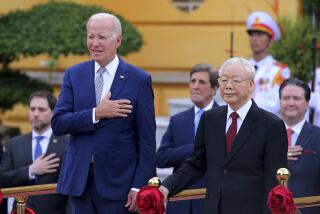Bush Calls Hanoi MIA Move a ‘Breakthrough’ : Diplomacy: But he wants a ‘full accounting’ of all cases of missing before normalizing relations.
- Share via
WASHINGTON — President Bush on Thursday called Hanoi’s decision to hand over archival information on missing American servicemen a “major breakthrough,” but he said he will continue to press for a “full accounting” of all unresolved POW-MIA cases before normal diplomatic relations are established with Vietnam.
Bush, who aides said may make a statement about U.S.-Vietnamese relations today, told CBS that “significant progress” was made by a presidential envoy who went to Hanoi last weekend seeking access to Vietnamese records on American servicemen held prisoner or missing in the Vietnam War.
Asked to comment on predictions by other officials that full relations could come within the next two or three months, Bush said that it is “a little optimistic” to expect the issue to be resolved that quickly. But he added that he wants normal relations and indicated that he might have more to say on the subject after he meets today with retired Gen. John W. Vessey Jr., the envoy to Hanoi on POW-MIA issues.
“This is a major breakthrough that’s happened over there, but I need to know exactly how major,” Bush said. “We’re not going to (establish normal relations) . . . until I can say in total conscience . . . that ‘here is a full accounting.’ But having said that, we have made significant progress.”
The photos, documents and other records brought back by Vessey from Hanoi are part of a larger trove of POW-MIA-related information that U.S. officials have been examining secretly for some time.
Access to the material--Hanoi had long denied its existence--was originally granted to an American researcher in Vietnam earlier this year by a Vietnamese official whose identity remains secret. While much of the material remains in Vietnam, between 4,000 and 5,000 photographs depicting dead servicemen were recently obtained from the researcher, former intelligence operative Tim Schweitzer, sources familiar with the documents said.
Confronted last September with evidence that it had been withholding information long contained in its war museums and archives, Hanoi agreed to open up its POW-MIA files and the Vessey trip was arranged to give the Vietnamese a “face-saving” cover for what was, in effect, a diplomatic capitulation on their part, the sources added.
The existence of the photos, quietly made known last month to members of a Senate panel investigating the fate of Vietnam-era POWs and MIAs, has helped resolve the cases of several missing servicemen. Pentagon spokesman Bob Hall confirmed Thursday that “a limited number” of MIA relatives already have been notified.
The secrecy in which the material has been shrouded in advance of today’s White House meeting drew criticism from several POW-MIA family activists who accused the Administration of delaying the release of the information to reap maximum political benefit on the eve of the elections.
“They’re really hyping this thing,” said Dolores Alfond, head of the National Alliance of Families for the Return of America’s Missing Servicemen. “They’ve had this information for some time. . . . The timing looks political.”
More to Read
Sign up for Essential California
The most important California stories and recommendations in your inbox every morning.
You may occasionally receive promotional content from the Los Angeles Times.










